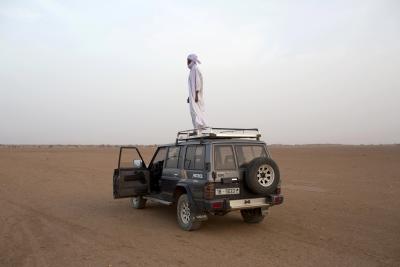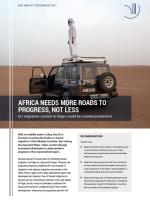DIIS Impact
Africa Needs more Roads To Progress, Not Less
EU migration control in Niger could be counterproductive

Recommendations
The EU must:
■ Make sure that human mobility in the Sahel region is not framed as contrary to security. In fact, well-managed cross-border economies facilitate stability and security.
■ Note that imposing security from the outside by military means sometimes creates insecurity for local populations in the Sahel. Lasting stability is created through growth and social cohesion.
■ Speed up the process of creating attractive work trajectories, especially for the youth. Considering the population growth in the Sahelian countries, this is a matter of the greatest urgency.
■ Make sure that human mobility in the Sahel region is not framed as contrary to security. In fact, well-managed cross-border economies facilitate stability and security.
■ Note that imposing security from the outside by military means sometimes creates insecurity for local populations in the Sahel. Lasting stability is created through growth and social cohesion.
■ Speed up the process of creating attractive work trajectories, especially for the youth. Considering the population growth in the Sahelian countries, this is a matter of the greatest urgency.
With no credible state in Libya, the EU is focused on putting the brakes on transit migration in the Sahelian countries. But closing the important Niger–Libya corridor through increased militarisation is detrimental to progress in this impoverished region.
Europe has put forward plans for inhibiting transit migration via Niger to Libya and Europe. However, the proposed projects to address the ‘root causes of migration’ and replace migration economies in the West African region with viable alternatives seem less developed and creative. Even if transit migration to Europe can be momentarily reduced in the vast desert of Niger, the EU must not hesitate to address the social and economic underpinnings of the current development. Insecurity and population growth will continue to pressure the fragile Sahelian states and stimulate outbound migration.
Human mobility is vital
Europe has put forward plans for inhibiting transit migration via Niger to Libya and Europe. However, the proposed projects to address the ‘root causes of migration’ and replace migration economies in the West African region with viable alternatives seem less developed and creative. Even if transit migration to Europe can be momentarily reduced in the vast desert of Niger, the EU must not hesitate to address the social and economic underpinnings of the current development. Insecurity and population growth will continue to pressure the fragile Sahelian states and stimulate outbound migration.
Human mobility is vital
There are legitimate reasons for wanting to counter militant jihadism, along with the smuggling of arms, drugs and the trafficking of women, but a blanket suppression of the ancient trans-Saharan routes may create more long-term problems than it solves. A growing focus on security and border control must take into account the beneficial regional effects of migration for development and regional integration. The freedom of movement between the West African states, enshrined in the ECOWAS protocols, now effectively stops in Agadez. The region, and especially the semi-nomadic peoples in the northern parts of the Sahel, need cross-border trade and mobility. There is a long history of trade and commerce between the countries, and poor people depend on mobility as a coping strategy. Enforcing security from the outside is having a detrimental effect on their livelihoods and could generate political instability.
Moreover, when the Libyan economy bounces back – and oil production reached one million barrels per day during the summer of 2017 – African migrants will be needed to rebuild the country. A strong and prosperous job market in Libya can take the migration pressure off Europe. Finally, militarisation of the Sahel may currently slow down migration towards North Africa, but is unlikely to stop it. Reports suggest that new and increasingly dangerous routes, in even harsher terrain, are currently opening and putting more migrant lives at risk.
Creating roads to progress
Moreover, when the Libyan economy bounces back – and oil production reached one million barrels per day during the summer of 2017 – African migrants will be needed to rebuild the country. A strong and prosperous job market in Libya can take the migration pressure off Europe. Finally, militarisation of the Sahel may currently slow down migration towards North Africa, but is unlikely to stop it. Reports suggest that new and increasingly dangerous routes, in even harsher terrain, are currently opening and putting more migrant lives at risk.
Creating roads to progress
The significant population growth in sub-Saharan Africa and the Sahelian region does, however, represent a great challenge, not only to regional economies but also, from a migration perspective, to Europe. Africa’s population is expected grow from about 900 million in 2013 to about 2.8 billion by 2060. Moreover, the working-age population, that usually informs migration flows, is forecast to grow even more rapidly from about 480 million in 2013 to 1.3 billion in 2050. Though 70 per cent of African migration takes place within the region, this development will arguably entail increased migration pressure on more developed economies. The International Monetary Fund (IMF) thus expects a sixfold increase in migration from Africa to OECD countries in the coming decades. This development calls for two responses.
- There is a need to develop ways of integrating an African labour force into recipient countries. This should allow for a positive contribution to growth and public finances, especially in countrieswhere the population is aging. It should also be noted that the resulting remittances, sent back from the foreign workers to their home countries, remain a stabilising factor in sending countries, both in terms of alleviating poverty and of insulating weak economies, like for instance Mali, against external shocks.
- Second, in order to manage migrant movements, Europe must invest in better family planning, health, education and meaningful work in developing countries. Managed the right way, the World Bank argues, Africa’s demographic development can lead to a positive transition that could become a window of opportunity for the impoverished region.
The EU must not only focus on stopping people from moving, but rather focus on giving people reasons to stay at home or at least to continue to migrate within growing economies on the African continent. More roads to progress on the African continent are needed, not less. In fact, economic growth and meaningful youth employment are probably the strongest and most lasting sources of stability, both when it comes to pre-empting insecurity but also with regard to high-risk migration to Europe. Fencing in the continent could have the opposite effect.
DIIS Experts

Photo/illustration by Lynggaardhansenfoto.dk

Africa Needs more Roads To Progress, Not Less
EU migration control in Niger could be counterproductive
